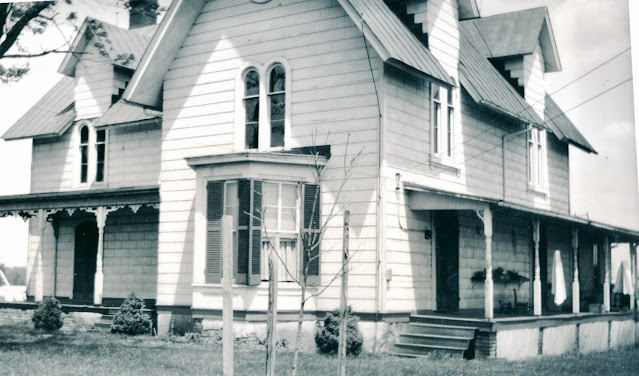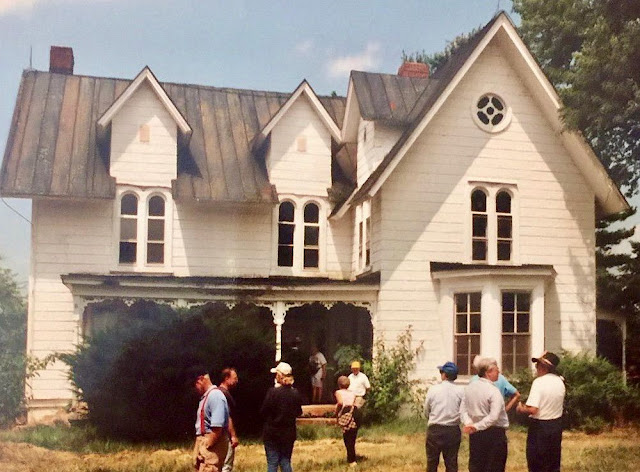 |
| "Clover Hill" in March 1864 |
 |
| A cropped enlargement of Custer with his staff on the front porch of "Clover Hill" in March 1864. (CLICK ON ALL IMAGES TO ENLARGE.) |
 |
| Frank Hampton (Find A Grave) |
1937
 |
| Works Progress Administration photo |
Spending part of his boyhood i n Monroe, Mich., George “Autie” Custer went off to West Point, where the undisciplined cadet graduated last in the class of 1861. Advancing rapidly in the Civil War, Lieutenant Custer functioned as a key aide and received high marks for his role at the Battle of Brandy Station, June 9, 1863. Appointed in late June 1863 as a brigadier at the age of 23 — the youngest general in the Union army — Custer received command of the Michigan Cavalry Brigade. He then effectively led his “Wolverines” in the Gettysburg Campaign.
Incontestably, Custer was a superb cavalry officer. Further, his men adored him simply because he led them into battle.
 |
| George Armstrong Custer and his bride, Elizabeth — best known as "Libbie," — about Feb. 15, 1864. (Library of Congress) |
Departing on their honeymoon, Custer escorted his bride to West Point, New York City and Washington, where huge receptions awaited them. An attentive Custer never left Libbie’s side, and her own early devotion to him was evident: “Every other man seems so ordinary beside my own particular star.” She also referred to Custer as “my dear life hero, my boy general.”
While in Washington, Custer received urgent telegrams from Army of the Potomac winter headquarters at Brandy Station directing him to report immediately for a “secret” assignment. Libbie pleaded not to be left behind, and the couple trained to Brandy Station in late February.
Soon arriving by coach at Stevensburg, Libbie was made comfortable at “Clover Hill,” the beautiful, church-appearing home of Jack Barbour. Barbour was not in residence. Custer quickly departed for a raid toward Charlottesville on Feb. 28 and returned to Clover Hill on March 2, where he determined to provide his wife an “army honeymoon.”
In honor of his bride, General Custer re-named Clover Hill “Camp Libbie.” For entertainment, Libbie was often hoisted into a “silver harnessed coach” and escorted to Mount Pony, where she toured the army’s main signal station. From atop the summit, Libbie wrote her parents that she observed the “white tents of the Army ... stretched far as eye could see.”
With her coach accompanied by mounted escort, Libbie also attended “six-course dinners” hosted by Custer’s superiors at Rose Hill and at the Dr. Daniel Green farm near Brandy. After spending just short of a month at Camp Libbie, General Custer secured a leave and took his wife on General Ulysses Grant's “special train” to Washington where their “official honeymoon” continued.
In mid- April, Custer deposited his wife in a Washington boarding house and he returned to the army for the “Overland Campaign.” Libbie much enjoyed Washington, where she met President Lincoln, commenting to her parents that he appeared to be the “most painfully careworn ... man I ever saw.”
Libbie lived in Washington throughout the remainder of the war and later followed her husband west to the plains. Following his death at the Little Big Horn, Libbie survived him by 57 years and “devoted the rest of her days to defending and gilding his memories.” They are buried together at West Point.
One is certain Libbie never forgot her “Stevensburg honeymoon.”
1984
 |
| Clark Hall |
1991
 |
| Clark Hall |
1998
 |
| Clark Hall |
2016
 |
| Clark Hall |
 |
| Clark Hall |
-- Have something to add (or correct) in this post? E-mail me here.
SOURCE:


Why is this beautiful home being left to rot? Why aren’t they saving it?
ReplyDeleteThis house was built for my 5th Great Grandfather, Col. John Slaughter. Some kind folks tried to buy it to preserve. Current owners have allowed it to deteriorate and stripped a lot from it, but refuse to sell.
ReplyDeleteThis is really a tragedy. Is there any chance the owners would sell? This home needs to be preserved. To just let it fall away is awful.
ReplyDelete